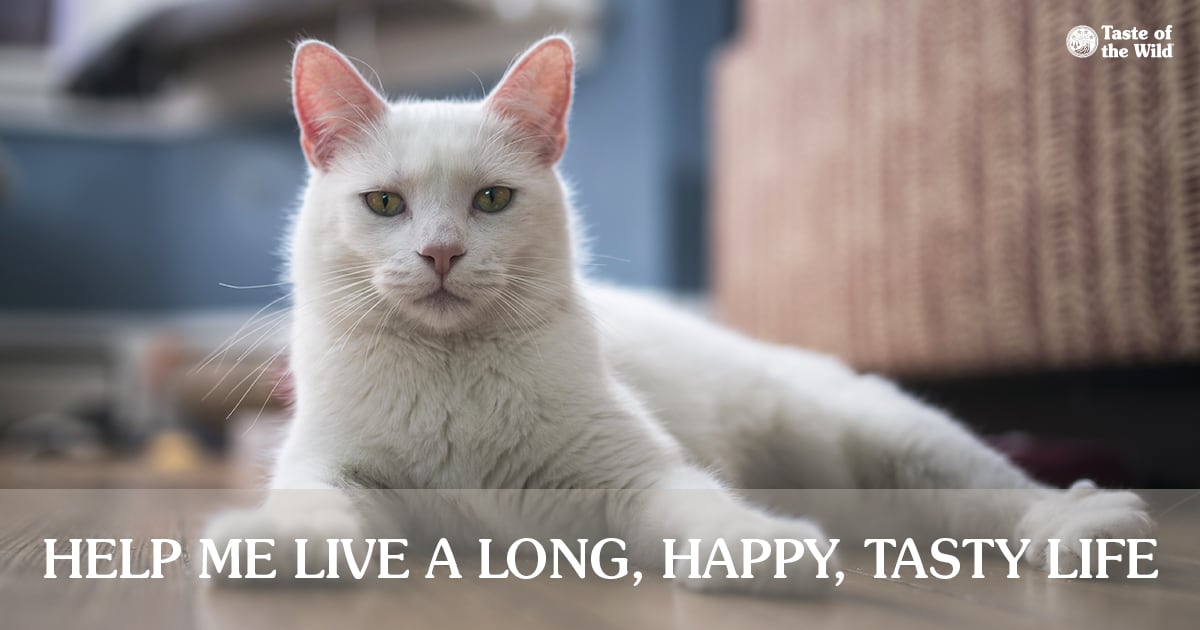
Cats are living longer, with some of them ticking past their twentieth birthdays and. As they age, cats often lose weight, especially after about age 11, becoming frail, bony versions of their younger selves.
Sometimes this can be attributed to one or more underlying diseases, such as inflammatory bowel disease, chronic kidney disease, hyperthyroidism (overactive thyroid), diabetes or cancer. Pain from arthritic joints can make it difficult to amble to the food bowl, and dental disease may mean the cat can’t chew hard kibble anymore.
Age-related losses in taste, smell or eyesight can also make food less appealing and put a damper on the appetite. But sometimes nothing can be found to explain the weight loss. What’s going on? And can the right senior cat nutrition help?
Trouble digesting nutrients
As is common in any aging being, some organs just don’t work as efficiently as they once did. This can be true for the digestive system, although no one is sure why, exactly, this happens.
Some older cats may have more trouble digesting protein and fat than their younger counterparts, so they may not absorb all the nutrients in their food. That’s why older cats may need a more energy-dense diet that’s designed to be easily digested.
Stress in the household
Cats can be creatures of habit, so changes in the home can cause stress. Home remodeling, inter-cat aggression or a new baby can all upset your cat’s regular routine, often leading to stress and a loss of appetite.
A loss of lean body mass
Cats need lean body mass — essentially everything in the body excluding fat, such as muscles, organs, skin and bones — to serve as a storehouse of proteins. When needed, cats can use these proteins for essential cell functions.
As cats age, they can experience sarcopenia, which is the loss of lean body mass and strength that is not caused by disease. It’s not always easy to tell if your cat is losing muscle mass when there’s still a layer of fat. However, losing lean body mass can compromise the immune system and put cats at greater risk for disease and death. Older cats with chronic inflammatory conditions or diseases can lose lean body mass, too, although this process is called cachexia.
Minimizing the loss of lean body mass, through eating appropriate dietary protein or treating underlying diseases, can help keep cats healthy as they age and perhaps even help them live longer.
Although it’s still not clear how much dietary protein older cats should be fed, one study suggested that older cats should receive higher levels of protein to help maintain lean body mass. The American Association of Feline Practitioners recommends that mature adult and senior cats that are healthy be fed a minimum protein allowance of 30 to 45 percent dry matter. This may not be true for cats with underlying diseases such as chronic kidney disease.
Helping your older cat
When you see your cat every day, you may not notice subtle changes in weight until a significant amount has been lost. As your cat grows older, especially after 10 years of age, make a point to monitor their weight on a regular basis, using your scale at home.
Same goes for your cat’s food and water intake, litter box use and behavior. If you notice any changes, bring them to the attention of your veterinarian as soon as possible.
Your veterinarian will give your cat a thorough exam and recommend diagnostic tests to rule out underlying diseases. Early diagnosis and treatment of those diseases may help stop or slow the weight loss. In some cases, such as chronic kidney disease, your veterinarian may recommend a prescription diet and possibly other therapeutics to help slow the disease process.
If your cat is losing weight or lean body mass despite being healthy, your veterinarian or veterinary nutritionist can determine your cat’s dietary energy and protein requirements and recommend a diet and daily feeding amount tailored to your cat. Ingredients such as antioxidants, probiotics and omega-3 fatty acids may also be helpful for older cats, to help them remain healthy for as long as possible.
The information in this blog has been developed with our veterinarian and is designed to help educate pet parents. If you have questions or concerns about your pet's health or nutrition, please talk with your veterinarian.
